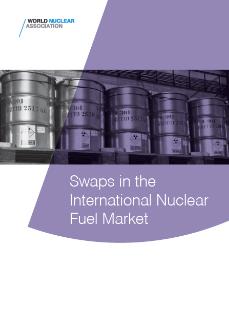Swaps in the International Fuel Market
Trade in nuclear fuel materials and services takes place between producers and consumers spread across a range of countries worldwide. To carry out such trade efficiently often requires that quantities of nuclear materials are exchanged, or ‘swapped’. This avoids the need to transport materials from place to place as they go through the various processing stages in the nuclear fuel cycle.
The trade in nuclear materials is subject to government restrictions and controls; some of these are designed to ensure non-proliferation of nuclear materials, while others are intended to achieve political, economic or strategic objectives.These restrictions are usually contained in bilateral agreements between the major countries involved in nuclear trade, resulting in a complex web of requirements and restrictions. Thus, another reason for swapping nuclear materials is to simplify the administration of fuel management by avoiding quantities of fuel becoming subject to the requirements of several different bilateral agreements.
Although simple in principle, swaps of nuclear material can be complicated by the various physical and legal characteristics of the nuclear fuel, including the isotopic composition, location, mining and customs origins, safeguards obligations, ownership, etc. There are also several different types of swap, depending on which of these characteristics is to be exchanged; these include ownership swaps,obligation swaps, location swaps and swaps between different forms of uranium.
This report describes the purpose and the operation of the various types of swap transaction, and the government restrictions and controls which affect them. It finds that some of the potential benefits of swaps (particularly obligation swaps) are not being achieved, due to sometimes cumbersome and unpredictable consent procedures. The ability to carry out such swaps more easily would in no way weaken the international non-proliferation
